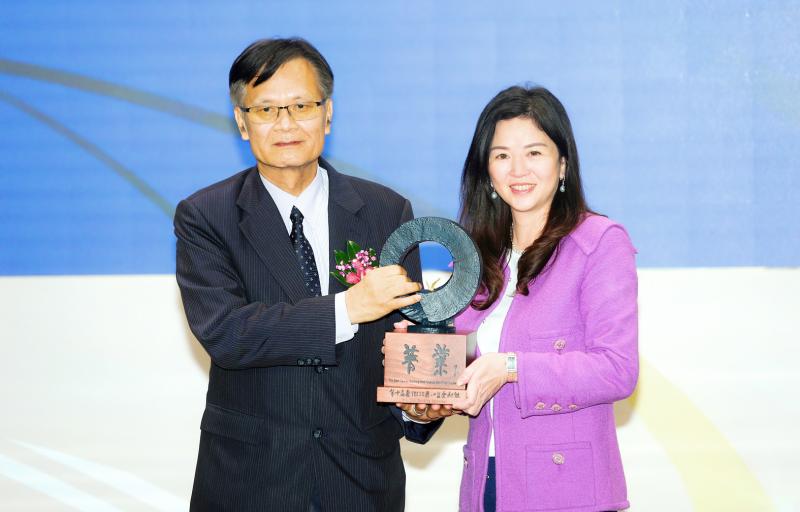Citibank Taiwan Ltd (台灣花旗) was presented with the Best Environmental, Social and Governance (ESG) Award at the Taiwan Banking and Finance Best Practice Awards — known as the Oscars of the financial sector — at a ceremony hosted by the Taiwan Academy of Banking and Finance in Taipei on Friday.
It is the first ESG award given by the academy, signaling that financial institutions are increasingly being influenced by ESG issues.
“We are honored to be recognized by the Taiwan Banking and Finance Best Practice Awards this year. At the same time, we also see that companies all over the world are paying more and more attention to ESG,” Citibank Taiwan chairman Paulus Mok (莫兆鴻) said in a statement. “Citibank Taiwan has enhanced its corporate social responsibility [CSR] with the framework of ESG profiles, and our ESG efforts have also truly reflected the hard work of all our employees. As a responsible financial institution that has operated in Taiwan for 56 years, Citibank aims to ensure sustainable operations.”

Photo Courtesy of Citibank Taiwan Ltd
“There is no best, only better,” Mok added.
Citibank Taiwan has set up concrete measures to implement sustainable development strategies. The bank developed “Citi ESG top 10 plans” in 2018 and last year, built an ESG development blueprint based on the UN Sustainable Development Goals, and has achieved 14 of the targets.
The bank has also upgraded its CSR report and plans to publish its first ESG certification report this year.
Over the past two years, Citibank Taiwan has supported the government’s “five plus two” innovative industries policy and assisted Taiwanese companies in moving toward a new economic model for sustainable development with lending of about NT$70.2 billion (US$2.5 billion), ranking first among foreign banks.
The bank has also answered a call from the government regarding its green energy and plastic reduction policies to work with non-governmental organizations formed by young people in promoting the country’s first public welfare renewable energy certificate and in creating the first illustration book about marine waste.
Citibank Taiwan’s “Pathways to Progress” program launched in 2016 has helped more than 1,000 young people successfully start their professional careers, and its promotion of financial management education has benefited more than 500,000 people in Taiwan, including students and new immigrants.
The bank has also launched programs to cultivate young people’s independent thinking ability and bolster their international competitiveness in keeping with the government’s policy to build Taiwan into a bilingual country by 2030.
Citibank Taiwan also received the Financial Supervisory Commission’s recognition in 2018 for assisting the Asia Pacific Group on Money Laundering (APG) to conduct peer reviews of members’ compliance with international standards in combating money laundering and terrorist financing.
The bank has been committed to creating a gender-friendly work environment and its proportion of female managers also tops all other financial institutions, according to the Taiwan Academy of Banking and Finance’s statistics.
Since the end of last year, maternity leave at Citibank Taiwan has been extended to 16 weeks and paternity leave to four weeks, with its number of days of paternity leave the most in the industry, the bank said.
Citibank Taiwan has won the Best ESG Award at the Taiwan Banking and Finance Best Practice Awards for two consecutive years, which not only indicates that the bank is moving in the right direction when it comes to promoting corporate social responsibility beyond traditional charity, but also affirms the bank’s three major ESG strategies for corporate sustainable development.
Looking ahead, Citibank Taiwan said that it would use its core strength in the financial industry to become the best partner for customers and the best workplace for employees, while at the same time deepening its focus on the ESG front, hoping to promote sustainable development in the environment, society and corporate governance.

South Korea’s equity benchmark yesterday crossed a new milestone just a month after surpassing the once-unthinkable 5,000 mark as surging global memory demand powers the country’s biggest chipmakers. The KOSPI advanced as much as 2.6 percent to a record 6,123, with Samsung Electronics Co and SK Hynix Inc each gaining more than 2 percent. With the benchmark now up 45 percent this year, South Korea’s stock market capitalization has also moved past France’s, following last month’s overtaking of Germany’s. Long overlooked by foreign funds, despite being undervalued, South Korean stocks have now emerged as clear winners in the global market. The so-called “artificial intelligence

‘SEISMIC SHIFT’: The researcher forecast there would be about 1.1 billion mobile shipments this year, down from 1.26 billion the prior year and erasing years of gains The global smartphone market is expected to contract 12.9 percent this year due to the unprecedented memorychip shortage, marking “a crisis like no other,” researcher International Data Corp (IDC) said. The new forecast, a dramatic revision down from earlier estimates, gives the latest accounting of the ongoing memory crunch that is affecting every corner of the electronics industry. The demand for advanced memory to power artificial intelligence (AI) tasks has drained global supply until well into next year and jeopardizes the business model of many smartphone makers. IDC forecast about 1.1 billion mobile shipments this year, down from 1.26 billion the prior

People stand in a Pokemon store in Tokyo on Thursday. One of the world highest-grossing franchises is celebrated its 30th anniversary yesterday.

Chinese artificial intelligence (AI) start-up DeepSeek’s (深度求索) latest AI model, set to be released as soon as next week, was trained on Nvidia Corp’s most advanced AI chip, the Blackwell, a senior official of US President Donald Trump’s administration said on Monday, in what could represent a violation of US export controls. The US believes DeepSeek will remove the technical indicators that might reveal its use of American AI chips, the official said, adding that the Blackwells are likely clustered at its data center in Inner Mongolia, an autonomous region of China. The person declined to say how the US government received